- Home
- Upton Sinclair
Dragon Harvest Page 15
Dragon Harvest Read online
Page 15
The round rosy face of the scholar-journalist Lighted up like a full moon coming out from behind the earth’s shadow. “Wunderbar, Herr Budd! Ausgezeichnet!”
“You may recall that at the time of our show in Munich, the Führer expressed admiration for the Detaze painting, Sister of Mercy, which I took to him. Since that time I have visited him several times at Berchtesgaden, and he has purchased half a dozen Detazes and put them in the Bechsteinhaus on the estate. Also he commissioned me to get him a couple of Defreggers in Vienna, and on these and other occasions he has confided to me his opinions concerning painting and architecture. I know that he is anxious to promote the improvement of taste in Germany, and it might be that testimony to this effect from a foreigner would be welcomed by your public.”
The Privatdozent would have rubbed his two hands together if it hadn’t been for the derby hat and an imitation-leather brief case. He found more adjectives to express his pleasure, and wanted to go right to work, lest this golden opportunity might somehow slip through his fingers. Lanny invited him up to the suite and cleared a table; the journalist spread out a loose-leaf notebook, tested his fountain pen, and then said: “Darf ich bitten, Herr Budd.”
So Lanny talked for an hour or more. He had told many people about the Führer’s art ideas, and his memory needed no refreshing. He was acquainted with the German public and the Nazi ideology, so he knew exactly what to say and how to say it. He didn’t talk about himself, except incidentally, or in answer to questions from the interviewer. Once the latter remarked, in a tone of envious worship: “You must find the business of Kunstsachverständiger extremely profitable, Herr Budd!” That gave Lanny the opportunity he wanted; he smiled complacently and replied: “I make more money than I know what to do with.” That would go into the interview—and when Monck read it he would take it as a hint!
III
Lanny had another date with Laurel Creston. She had thanked him cordially for his discourses; she had gone so far as to say that she had never learned so much in one morning in her life. This was practically suggesting that he should favor her with more of the same; and, of course, there were other great collections in Berlin, especially the National Gallery. It seemed in a way a duty for Lanny to escort her there, for some day she might be wishing to write a story called “The Art Expert,” and however satirical she might be, it would be better if she had her facts right.
The same thing applied to music, of which she was fond, but possessed little technical knowledge, so she admitted. He had taken her to the Berlin symphony, then conducted by Furtwängler, who had made his peace with the Nazis—no relative of Oberst Furtwaengler of Der Dicke’s staff. Before and after the concert, Lanny treated her to discourses on the three B’s of German music, and incidentally revealed the fact that he himself had been pounding the piano since early boyhood, and had several times had the honor of playing for the Führer of all the ogres and troglodytes.
In short, Lanny was permitting himself to enjoy the company of a charming and intelligent lady, and the pleasure of making an impression upon her. The lady, for her part, could not have failed to be aware that this was an unusual man, and with her shrewd mind she had begun to realize that there was something mysterious about him. His Weltanschauung, as the Germans call it, appeared to be in a state of Verwirrung. He would express that lofty indifference to politics which had so exasperated her at their first meeting; but before long, in the course of a discussion of art or music, he would express opinions which seemed indisputably political. She was a lady who knew what good manners were, even though she didn’t always choose to have them, and now she did not challenge his remarks, but listened, and put this and that together, and wondered if it could be business that caused his extreme reticence. He told amusing stories about his rich clients—though never naming them. Were they all so intolerant of any political or economic heresy that an art expert had to alter his entire life pattern to please them?
There was a Detaze in the National Gallery. Lanny remarked: “We sold it to them after we had our one-man show in Berlin, six years ago. We let it go for a nominal price, because we thought it would pay to have him represented here.” That was taking a point of view of art which Laurel Creston found new. This genial Mr. Budd didn’t appear to be a greedy person; why did he have to talk so much about money—and to make so much?
They stood in front of the painting, a view of the Roman ruins of Antibes, and Lanny told the story of Marcel Detaze, gay yet wise Frenchman who had been a growing boy’s guide; of his technique, the ideas he had held and sought to express, and some of the episodes of his life. They had sailed on the yacht Bluebird, owned by a soap manufacturer, and Marcel had painted every day, while the other guests tried to win one another’s money at bridge. They had visited the Isles of Greece, celebrated by Lord Byron; they had sat among the ruins of Athens and later of Carthage. “Ruins always fascinated him,” said the painter’s stepson; “you see how he tries to give you the sense of melancholy, the futility of human labors. ‘Even my paintings will some day be ruins,’ he would say, with a smile. ‘All our efforts at permanence are doomed to failure, and the only thing that survives is change.’ He would recite Shelley’s sonnet about Ozymandias, king of kings. ‘Look on my works, ye Mighty, and despair!’”
IV
Later on Lanny told about the tragic changes which had come in the painter’s own life; the war, and the peril of his beloved patrie, and his service in the army, and having his face burned off, and sitting in his studio at Bienvenu, wearing a white silk mask and painting masterpieces. “His sufferings had a great deal to do with his fame, for it seems that humanity has to have martyrs. But Marcel’s technique has won the praise of the most exacting critics. We don’t make any effort to push his work, but there is a steady demand for it, and the more we raise the prices, the more people seem to value it. Only a few weeks ago an American yacht turned up at Cannes, and the owner asked to see the works and insisted upon buying two of them.”
“What was the name of the yacht?” asked Miss Creston; and when Lanny said, “The Oriole,” she exclaimed: “How odd! It’s owner is my uncle.”
So then they had something else but paintings to talk about. Lanny hadn’t asked any personal questions about Miss Creston; but now he learned that she was a Baltimorean, a daughter of Reverdy Holdenhurst’s sister. She didn’t say any more about her parents, or why she had left home in a manner unusual for Southern ladies. She said that she had taken one of the Oriole cruises, several years ago, and Lanny mentioned that Reverdy had invited him on the voyage to the States. “You would have found it rather slow, I am afraid,” she remarked.
She asked who had been on board, and he named several of the guests, persons whom she knew. He mentioned Lizbeth, but of course said nothing about the conspiracy of his mother and her friends, which would have been boorish of him. “A very lovely child,” he remarked; and the woman replied: “She ought to be more than that by now. I’m afraid she’s somewhat spoiled.”
“She adores her father,” Lanny countered, with his usual amiability.
“She must know that he is not a happy man. He would like to do something useful, but his desires exceed his capacities. That is true of all the members of our family, I think.”
“I don’t know,” said Lanny, gallantly. “If I had been asked about you, the first thing I should have said is that you know exactly what you can do, and are doing it.”
The woman smiled a brave little smile, and replied: “That means that you have read one of my short stories; but you have never seen the trunkful of manuscripts at home—to say nothing of all the ashes!”
V
The Herr Privatdozent had feared delays in the publication of his interview, because everything which quoted the Führer had to be submitted to a member of his staff who had been especially deputized for that purpose. But evidently that unknown personage was friendly to the American visitor, for the permission was granted at once, and the interview appeared in th
e Völkischer Beobachter. This was the Führer’s own paper, published by his close friend, Herr Ammann, who also published Mein Kampf and vast quantities of other Party literature from which the Führer derived his income. Thus he could say that he took no salary as Reichskanzler, and thus increase his reputation for sainthood.
The interview with Herr Lanning Prescott Budd was restrained and dignified, and even the ivory-tower art world couldn’t call it fulsome. It was a fact that Adi Schicklgruber loved art, and had done his best to encourage it; his tastes were limited and somewhat commonplace, but there were many good things within the limits of such taste and Lanny had talked about these. Included were the works of Marcel Detaze, and it was money in Lanny’s pocket to mention them to the German public. He was perfectly willing to have the art authorities suspect that that was the motive behind his praise of the Führer. What he wanted was to keep himself solid with the inner circle, and be able to continue his visits to the Berghof and to the office in the New Chancellery building on the Wilhelmstrasse.
“Everybody” read the article, and those whom Lanny met praised it. He bought a bundle of copies and mailed them around: one by airmail to Robbie, to let him know what was going on, and one to Göring in San Remo, to let him know what a competent art expert he had; copies also to Kurt and to Lili Moldau and other Germans in Paris; to Forrest Quadrate in New York, and other Nazi agents and sympathizers there—it was a chance to make himself solid with a host of people whom he might want to make use of. He would keep some spare copies, for use whenever and wherever he might seek to establish himself as a friend of the Neue Ordnung.
Naturally he sent one to Laurel Creston. Her German was far from perfect, but she would get the gist of it, and anyone in the pension would be glad to help her out. He didn’t take it to her, because he was sticking close to the hotel, on the chance that Monck might telephone. Meantime he carried on imaginary arguments, in which the article made her mad, and she called him a nasty Nazi; he amused himself by letting her pour out her irritation, and then revealing the truth to her, witnessing her consternation and accepting her apologies—all this, of course, in his innermost secret heart.
Oddly enough, this sequence of scenes was not entirely new to Lanny; for it was the procedure which had been suggested by Nina Pomeroy-Nielson, one of his old friends, as a way by which he might find himself a wife. He would meet some anti-Nazi woman, and she would be angry with him, and argue with him; he would listen to her respectfully and gradually let her convert him, until he knew her well enough to trust her, and to be sure that he loved her. Then—grand dénouement!—he would tell her the truth about himself, and they would clasp each other in their arms and live happy ever after.
But where? And how? Would the woman forsake her anti-Nazi world and go away and hide somewhere, never letting one of her friends know that she was consorting with a Nazi sympathizer notorious for his intimacy with Hitler, Göring, and Hess? Would she give up writing anti-Nazi stories, or would she take to publishing them under a pen name and concealing her identity, even from her publisher? That was a chain of imaginings hard to make plausible. How, for example, would she get her royalty checks?
Thus Lanny, staying close to the hotel and keeping watch on his mail. Surely now, if Bernhardt Monck was alive and anywhere near Berlin, he would see that published interview, or hear about it from some friend. Surely he would understand that it was an offer of money; and what a novel kind of political agitator he would be if he didn’t want some!
Sure enough, here came the letter; Lanny knew it as soon as it was handed to him at the hotel desk; a plain envelope, with no return address, and undistinguished handwriting. Lanny took a seat in the lobby, not showing any haste; he opened the envelope casually and read:
“Sir: I wish to call your attention to the work of a painter of talent. I would be pleased if you would call Wednesday evening at eight. If this is not convenient, I’ll expect you on the first evening possible. Yours respectfully, Braun.”
Nothing in that to excite the suspicions of any Gestapo agent! No place mentioned, because they had previously agreed upon a place—the same street corner in the Moabit, a working-class district where Trudi Schultz had been accustomed to meet Lanny in the old days before she had become his wife. Absit omen!
VI
In the years while the son of Budd-Erling had been helping to finance the underground against the Nazis, he had worked out a technique which had become semi-automatic. First, there would be the business of getting money which could not be traced. Large bills from the bank would be exchanged in stores where luxury goods were sold: a handsome box of candy, some costly flowers, some toys for children. Kurt’s frugal and hard-working little blonde wife in Stubendorf would appreciate useful gifts for their six little ones, and would tell Kurt about it, and both would find it touching that this wealthy playboy should remember the old days and the happy visits he had paid. The same thing applied to the family of Heinrich Jung—Lanny had the names of all these little ones in his notebook, so that he could put in cards with the gifts.
The candy would be for the Fürstin Donnerstein, who appeared to need fattening, and the flowers would be for some other hostess who had entertained him, or some owner of a painting which Lanny had recently purchased. Thus one made and kept contacts in die grosse Welt; and thus Lanny would have his pockets stuffed with mark notes of various denominations and no consecutive serial numbers. Thus if the Gestapo caught a member of the underground they couldn’t start calling on the banks to find out who had recently drawn thousand-mark notes of consecutive numbers.
After that, the conspirator would drive to the place appointed, on some obscure and unfrequented street, always at night. On the way he would turn several corners, watching in the little mirror of the car to make sure he was not being followed. He would approach the place slowly, as if looking for a street number. Seeing his man Lanny would draw up at the curb, somewhat in front of him, and if at the last moment there should be any sign that they were being watched, the man would walk on without paying attention; on the other hand, if all seemed safe, the man would slip into the seat beside the driver and they would speed away, not forgetting to turn several corners and make sure no car was following.
This time Lanny’s confederate was, presumably, traveling on a forged passport; the police had his photographs, fingerprints, and record—they had these for everyone in Germany, and for everyone who had ever been in Germany; if for any reason they had occasion to investigate him, it would be his end—his head would be chopped off in a public ceremony by an executioner wearing a dress suit. This meant that Monck, alias Herzog, alias Branting, alias Braun, couldn’t stop at any hotel or lodging house, for all such visitors had to be at once registered with the police. He couldn’t stay in a home where there were servants without risk of being reported and having a whole family thrown into a concentration camp. He would have to stay in a hiding place by day, and never go into any public place where one of his numerous enemies might recognize him.
How he was managing all this Lanny had no idea. It was the first principle of underground life that you neither asked questions nor answered them. If you asked, it made you an object of suspicion. In the far-off days which now in retrospect seemed so happy, being a Social Democrat had been like being an amoeba in a pond; you circulated freely, and encountered thousands of others. But now what few were left were like those amoeba which grow in chains; you knew the one who was joined to you, but you didn’t know the one who was joined to him. If your contact was broken, if your comrade disappeared, you waited in fear and trembling to learn if he had weakened under the dreadful tortures he would have to endure. If a new man approached you, it was hard to make sure whether he was a friend or a would-be betrayer, and you watched him for a long time before you let him know that you were anything but the Führer’s most loyal servant. It was “living dangerously,” as Nietzsche had advised.
Lanny had trusted Bernhardt Monck because Trudi had told him to
; but he hadn’t felt really sure of the man until he had seen him marching with the International Brigade to the defense of Madrid. From that time on, this ex-sailor and trade-union leader represented the anti-Nazi cause in Lanny’s mind. It was the fashion among smart people to sneer at “parlor Pinks” like Lanny, and to picture them as the dupes of cunning “Reds” like Monck; but to Lanny it appeared that if there were any heroic souls on this earth, they were the men and women who were keeping the sparks of truth and freedom still burning in the inferno of cruelty and torment which Germany had become.
VII
“I saw that interview about Hitler,” Monck began. “Wirklich fein!”
“It was meant for you,” was the reply.
“Na klar! I was waiting to get something important; and now I have it.” Monck paused for a moment. “Tell me, could you leave Germany at once?”
“I haven’t finished what I came for; but I could leave and come back, if it was necessary.”
“Here is the situation: I have some information which cries out to be spread widely. It’s of such a character that I have not put it into writing; I have memorized it, and you would have to do the same. I am hoping that you can find some way to get it published.”
“I’ll make a try, if it is as urgent as you say.”
“Well, here is the situation. You recall that in the Four-Power Pact, signed in Munich last September, Hitler undertook to guarantee the borders of Czechoslovakia as they were there agreed upon. Since then Ribbentrop has steadily evaded carrying out that promise. The British and French have been pressing him, but not very hard.”

 Prince Hagen
Prince Hagen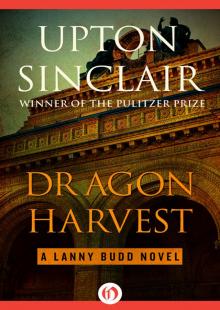 Dragon Harvest
Dragon Harvest The Jungle
The Jungle Sylvia's Marriage
Sylvia's Marriage Oil! A Novel by Upton Sinclair
Oil! A Novel by Upton Sinclair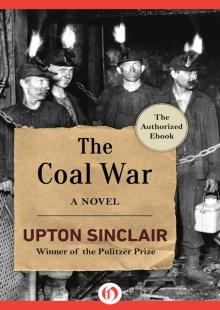 The Coal War: A Novel
The Coal War: A Novel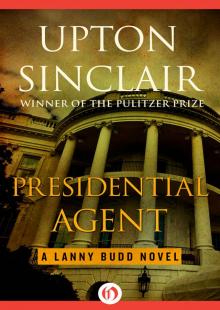 Presidential Agent
Presidential Agent World's End
World's End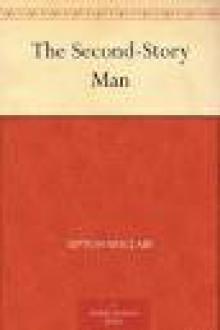 The Second-Story Man
The Second-Story Man O Shepherd, Speak!
O Shepherd, Speak!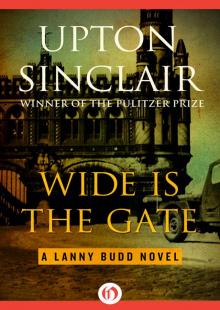 Wide Is the Gate
Wide Is the Gate The Return of Lanny Budd
The Return of Lanny Budd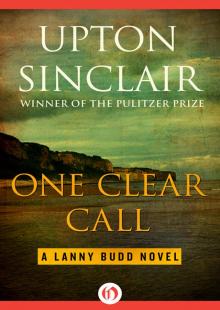 One Clear Call I
One Clear Call I 100%: the Story of a Patriot
100%: the Story of a Patriot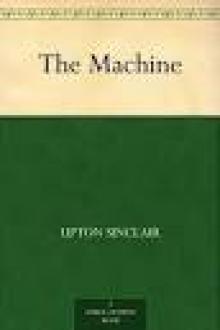 The Machine
The Machine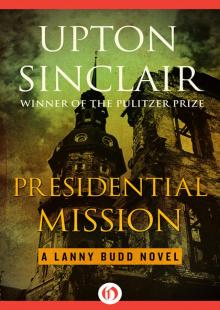 Presidential Mission
Presidential Mission A Cadet's Honor: Mark Mallory's Heroism
A Cadet's Honor: Mark Mallory's Heroism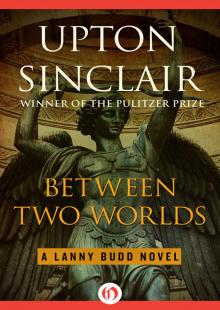 Between Two Worlds
Between Two Worlds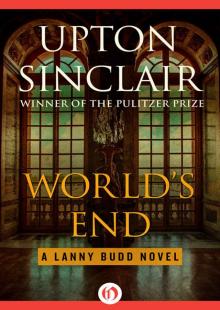 World's End (The Lanny Budd Novels)
World's End (The Lanny Budd Novels)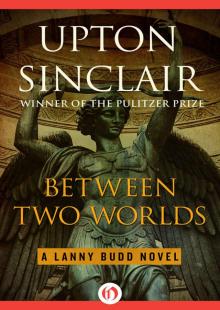 Between Two Worlds (The Lanny Budd Novels)
Between Two Worlds (The Lanny Budd Novels)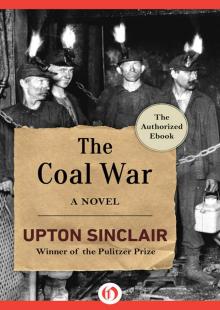 The Coal War
The Coal War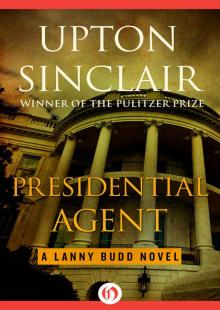 Presidential Agent (The Lanny Budd Novels)
Presidential Agent (The Lanny Budd Novels) Oil (filmed as There Will Be Blood)
Oil (filmed as There Will Be Blood)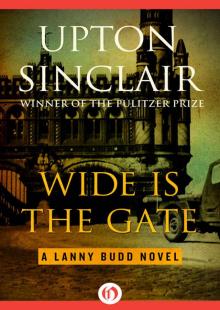 Wide Is the Gate (The Lanny Budd Novels)
Wide Is the Gate (The Lanny Budd Novels)